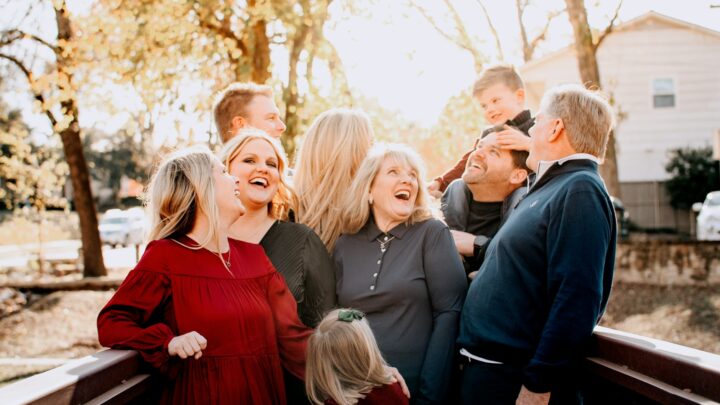Dysfunctional families don’t just leave you with wounds—they often leave you with qualities you didn’t realise came from survival.

Some of your most impressive strengths? They were forged in fire. These traits might look like confidence, calm, or competence on the outside, but many of them started out as coping mechanisms. Here’s how growing up in a chaotic or emotionally unsafe family environment might’ve shaped who you’ve become today.
1. You’re insanely good at reading a room.

You don’t even realise you’re doing it. Your eyes clock the mood the second you enter a space. The vibe, the tension, who’s off, who’s about to blow—you sense it before anything’s said. That hyper-awareness started because you had to keep yourself emotionally safe. But now, it’s a skill. You know how to adjust, navigate, and respond fast, without needing things spelled out.
2. You notice what isn’t being said.

In families where communication was vague, tense, or laced with guilt trips, you learned to read between the lines. You got used to watching people’s body language, tuning into their tone, picking up on the pauses where truth lived. That makes you emotionally perceptive in adulthood. You’re someone who notices the details other people miss, and that can make you an anchor for those around you.
3. You’re resourceful to a fault.

When you couldn’t rely on the adults around you, you learned how to rely on yourself. You figured out how to solve problems, adapt quickly, and work with what you had, even if it wasn’t much. Now, you’re the person who makes it work when everything falls apart. You’re inventive, fast-thinking, and able to hold things together even when no one else knows how.
4. You know how to defuse tension like a pro.

You’ve likely become the one who keeps the group chat from blowing up. The one who knows how to lighten the moment, steer conversations away from landmines, or talk someone down without making it obvious. This didn’t come from peace—it came from needing to avoid emotional explosions growing up. Now, it’s a strength. You bring calm to chaos, even when your own nerves are quietly fraying.
5. You’re deeply loyal, sometimes to your own detriment.

If you grew up fighting to keep the love you had, you learned to hold on hard. That loyalty became your language, your glue, your proof of care. Even now, you might stay in situations long past their expiry date. The upside is that when you care, you’re all in. You’re devoted, and you don’t flake. You show up fully, and people feel safe because of it.
6. You’re emotionally attuned to other people.

Maybe you were the emotional sounding board for a parent. Or, maybe you were the one who absorbed everyone’s stress without saying a word. Either way, your emotional sensitivity became a finely tuned radar. Now, you can sense when someone’s not okay, even if they say they are. That depth of perception can feel like a burden sometimes, for sure, but it also makes you an incredibly compassionate friend and partner.
7. You’re uncomfortable being the centre of attention.

If your childhood taught you that being seen meant being criticised, you learned to hide in plain sight. Now, compliments make you fidget. Public praise feels exposing, not uplifting. The beauty of this trait? You’ve developed a calm confidence. You don’t need applause to know your worth—you just keep showing up with humility and consistency.
8. You’re great at anticipating other people’s needs.

You figured out that preempting what other people needed helped keep things calm. So now, you’re often the one who brings the charger, packs the snacks, or senses when someone’s about to unravel. It can be exhausting to always be “on,” but it also means you’re the person everyone trusts. You make people feel looked after, without them needing to ask.
9. You rarely ask for help.

Because growing up, help either didn’t come, or came with strings attached. You learned early on that asking made you vulnerable, so you adapted. You became hyper-independent. That makes you look strong on the outside, but inside, it can be lonely. Deep down, you probably long for someone to notice your struggle without needing you to spell it out.
10. You over-explain yourself, even when you don’t need to.

If you were often misunderstood, criticised unfairly, or made to feel guilty, you likely learned to explain everything in detail. Not because you want to, but because you feel like you have to justify your every move. Now, you’re probably great at clarifying and articulating your intentions. However, that old habit of over-explaining is something you deserve to grow out of, especially in safe, healthy spaces.
11. You find it hard to relax, especially when things feel too calm.

When calm was just the quiet before the next explosion, peace became suspicious. Now, even when everything seems okay, part of you is waiting for the rug to be pulled out from under you. This is nervous system wiring, not personal failure. But knowing it gives you a starting point. Rest doesn’t have to feel risky. Safety doesn’t have to feel unfamiliar forever.
12. You’re always prepared for everything.

You don’t just plan—you plan for what might go wrong. You know where the exits are. You’ve got plasters, snacks, backups, and five versions of a plan B. It might look like overkill, but it makes you feel safer. It’s how you created a sense of control in a world that felt unstable. Even now, that preparedness keeps you steady when other people are falling apart.
13. You can be incredibly hard on yourself.

If love was earned in your household—through achievement, helpfulness, or perfection—you internalised the idea that you have to be exceptional to be worthy, and that no mistake is small. That rest is a privilege, not a right. That self-criticism might push you to achieve a lot. But it’s also a wound that needs gentleness. You don’t need to be hard on yourself to be good. You just need to be whole.
14. You’re the one people come to in a crisis.

You’ve learned how to keep your head when things go sideways. You’ve seen what chaos looks like, and you’ve survived it. That made you reliable. Solid. The go-to in everyone else’s emergencies. It’s a powerful trait, but it can also be isolating. Just don’t forget: being the strong one doesn’t mean you don’t also deserve softness, support, and someone else holding space for *you.*




